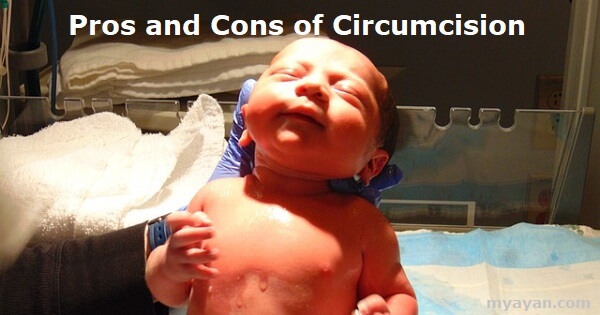Circumcision is a procedure that is usually done at an early age. Newborn baby boys are commonly circumcised within the first two months of birth because they tend to heal more quickly at this stage. After two months of age, the procedure may require general anesthesia. Adult circumcision typically involves a slightly more complex procedure than circumcision during infancy. This procedure may also help to reduce the risk of infectious diseases, such as HIV and other STIs. Since it's a surgical procedure, it comes with risks and disadvantages. The debate continues on whether or not it's beneficial to perform circumcision. Let's highlight some of the pros and cons of circumcision.
Circumcision of newborn males has health benefits, but most of them are not significant until young adulthood. The following pros of circumcision include:
UTIs occur when bacteria enter the bladder or kidneys and cause inflammation. This bacteria can lead to pain, burning sensations, and frequent urination. Infants are more vulnerable to UTIs because their bodies are undeveloped to resist certain bacteria.
Uncircumcised infants may be more likely than circumcised ones to develop a UTI. Since bacteria can accumulate under the foreskin and easily spread into the urinary tract. Circumcision helps remove this extra source of bacteria and may thus lower the risk of developing a UTI.
The main reason why circumcision promotes easier hygiene is because it reduces the amount of skin that accumulates around and underneath the foreskin. Without this extra skin, bacteria and other potential contaminants have fewer places to hide and cause infections. Circumcised men are less likely to develop penile inflammation or infections caused by trapped sweat, dirt, and body oils.
Circumcised men require less frequent cleaning of their genitals as there is less dirt accumulation due to the reduced amount of loose skin. This can make daily genital hygiene faster and more efficient for those who have been circumcised.
Circumcision has long been known to lower the risk of certain sexually transmitted infections (STIs), including HIV, herpes, and human papillomavirus (HPV). Recent research suggests that circumcision may also have a protective effect against other STIs. Studies have found that circumcised men are significantly less likely to contract gonorrhea, chlamydia, and syphilis than uncircumcised men.
Because these infections often don't show any symptoms in the early stages, it is important for individuals who are sexually active to practice safe sex measures such as the proper use of condoms and regular testing for STIs.
Circumcision has been shown to reduce the risk of certain forms of cancer. The primary benefit is a reduced chance of developing penile cancer. This form of cancer is rare, but it can still occur in uncircumcised men at higher risk due to family history or environmental factors. Research shows that circumcision reduces the risk of penile cancer by up to 40%.
Circumcision eliminates the possibility of developing foreskin-related infections, including phimosis, a rare condition that makes it difficult to retract the foreskin because the foreskin is removed during the procedure.
Despite its potential benefits, there are also drawbacks to circumcising a baby. Some of the cons include:
Circumcision requires cutting off the foreskin of the penis, which can be painful for a newborn baby. Even if anesthesia is used during the procedure, it still causes pain and stress to the infant.
As with any surgery, circumcision carries excessive bleeding, infection, and scarring risks. In rare cases, serious complications can also occur, including damage to other parts of the penis or even death in extreme cases.
Circumcised males may lose sensitivity in their penises because the foreskin is cut away during the procedure. This can affect sexual pleasure and other physical sensations during urination and touch.
Circumcision is an elective surgery, so health insurance plans do not always cover it. This means parents will have to pay out-of-pocket for the procedure if they circumcise their baby boy.
Some people feel that circumcision should be a personal choice rather than something that's decided for them at birth, as it has been historically linked with certain religious and cultural traditions.
Conclusion
Choosing whether or not to circumcise is a very serious decision and should be taken seriously by all parents. Circumcision has advantages and disadvantages; ultimately, it is a personal choice and depends on your needs. Although the procedure has potential drawbacks, the benefits of circumcision often outweigh the risks. It can help reduce the risk of infection, improve hygiene, and keep future health problems at bay.
To stay on the safer side, take some time to consult with your doctor and ask any questions you may have. Ultimately, only you can decide what is best for your young one concerning circumcision. Don't forget to look into all the pros and cons of circumcision wisely– because this surgery will have a long-lasting effect on your child’s well-being.

Infant circumcision may decrease urinary tract infections, sexually transmitted diseases, and penis cancer. While there is a risk of bleeding, infections, and penile injury associated with circumcision, such complications are uncommon.
While there is a small chance of scarring, circumcision typically only carries minor risks like bleeding or infection. It's worth noting that some parents opt for the procedure due to religious or cultural beliefs. Additionally, there are potential health benefits to circumcision, including a lower risk of urinary UTIs and STIs.
While circumcision may decrease sensitivity in the penis, it does not have a negative effect on sexual activity. Removing the foreskin can increase the duration of ejaculation, which may result in longer sexual intercourse.
It is recommended to perform circumcision on boys under one-year-old as it minimizes the risk of anesthesia complications. Prolonged hospital stays increase the possibility of infection and also raise the overall cost.